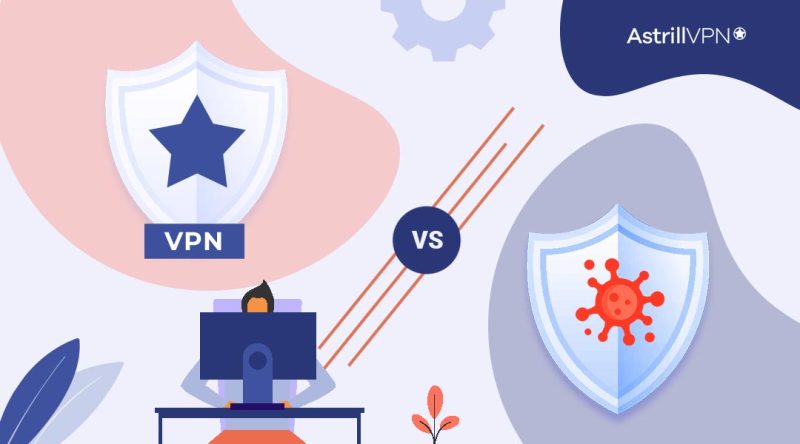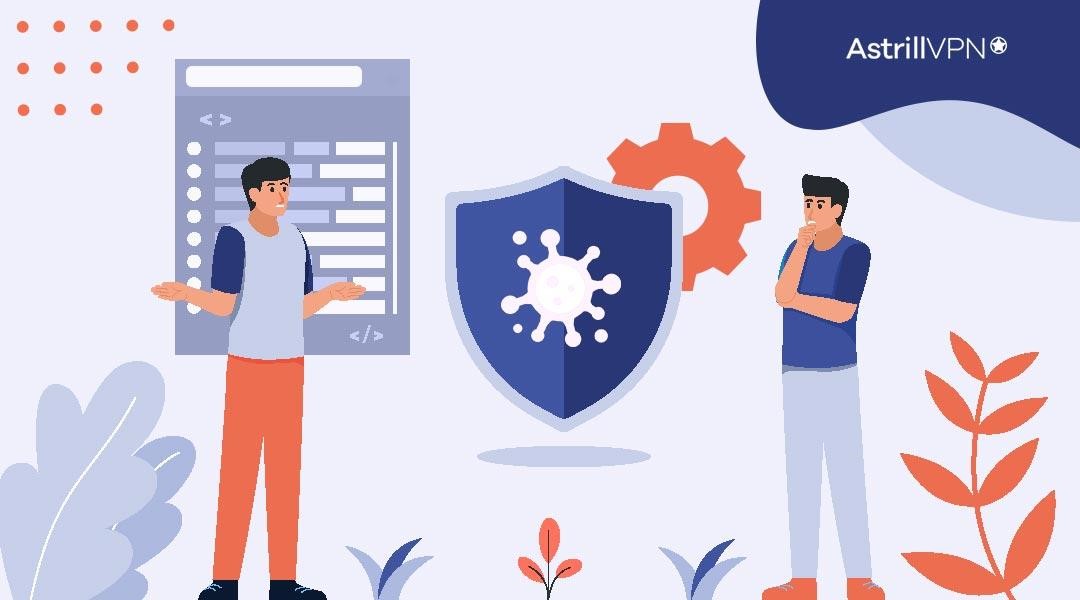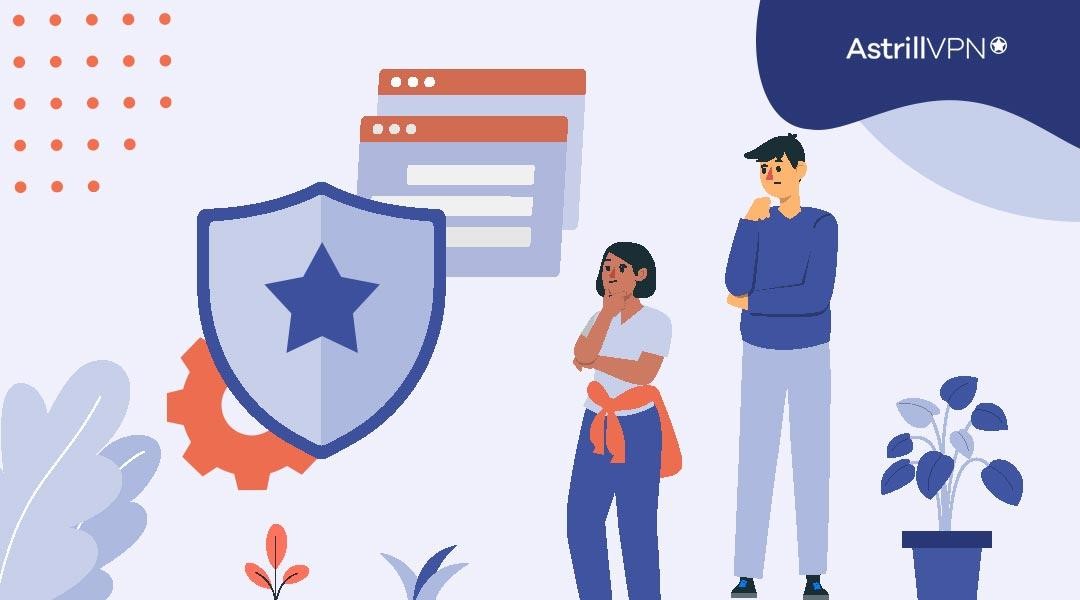VPN vs. Antivirus: Understanding the Differences

Urfa Sarmad

In the current digital landscape, the need for privacy and security is at an all-time high. Safeguarding our online presence has become a huge priority, with cybercriminals lurking about, just waiting for the perfect opportunity to compromise users’ confidential data.
Threats are rising rapidly, making a virtual private network (VPN) and antivirus protection essential parts of your security toolkit. For example, malware and ransomware attacks are escalating: globally, there were approximately 6.2 billion malware attacks detected in 2024, up from about 5.8 billion in 2023, according to data compiled by Astra Security and Statista.
Meanwhile, phishing attempts are also surging; Kaspersky reported nearly 900 million phishing attacks worldwide in 2024, which represents a 26% increase compared to 2023 (Kaspersky, 2024).
At the same time, VPNs are becoming mainstream. As of 2024, there are over 1.6 billion VPN users globally. You need both antivirus and VPN because they defend against very different, yet increasingly common, cyber threats.
Buckle up your seatbelts; we’ll get into all these questions in-depth. So without any further ado, let’s get started!
Table of Contents
VPN vs. Antivirus – In A Nutshell
What a VPN protects:
- Encrypts your internet connection so that others (e.g., on public WiFi) can’t eavesdrop on your traffic.
- Hides or conceals your IP address and location, making tracking harder and helping with privacy.
- Secures remote or hybrid access (e.g., when working from home or on the move).
- Helps bypass some geo-restrictions or censorship (if legally permitted).
- Helps protect data in transit from interception or “man-in-the-middle” attacks.
What an Antivirus protects:
- Detects, blocks, or removes malware (viruses, trojans, worms) on your device.
- Scans for malicious attachments, downloads, suspicious links, or infected files.
- Guards against file-based infection or exploitation of vulnerabilities on your device.
- Monitors system behaviour to stop known threats and sometimes unknown ones via heuristics.
- Helps protect the integrity of your device and the data stored on it from being compromised.
Usage Statistics about VPN and Antivirus
VPN usage statistics:
- As of 2023, there were about 1.5 billion VPN users worldwide, representing ~31% of all internet users.
- Global VPN downloads and adoption rates continued to grow: for example, global VPN adoption rose from ~6.95% in 2020 to ~10.58% in 2024 (per one dataset).
- In the U.S., VPN usage among adults was reported at 32% in 2025 (down from 46% in 2024) in one survey.
- The global antivirus software industry reached ~$4.25 billion in 2025; similarly, the VPN app market had revenue of ~$5.9 billion in 2024.
- About 69% of VPN users access mobile devices, 72% via desktops/laptops.
Antivirus usage statistics:
The antivirus software industry grew to ~$4.75 billion globally in 2025, up from ~$4.06 billion in 2022.
Why Do You Need Antivirus Software?

There are many reasons why you’d need Antivirus on your device:
Protection Against Malware
Malware can include viruses, trojans, ransomware, spyware, or anything potentially threatening your online security. Antivirus detects and removes this malicious software from your device so that it doesn’t get compromised or its performance is affected.
Real-time Monitoring
Antivirus software updates your system in real-time, scanning all your files, downloads, and websites for potential threats. It also checks if any files on your device are corrupted. It identifies and stops any malicious activity before it harms your computer, proactively protecting your device against emerging threats.
Email & Web Protection
Many antivirus software programs offer email and web protection. It scans emails to ensure no malicious links and blocks websites that may host Malware or plan to implement phishing scams. By adding an extra layer of security, Antivirus prevents you from becoming a victim of malware attacks or phishing attempts and protects you from downloading harmful content.
Performance Optimization
Antivirus software protects your device from Malware attacks and helps improve its performance. It scans and removes unnecessary files and temporary issues and notifies you of any problems that may be slowing down your device or affecting its performance. Antivirus software enhances the user experience by improving performance and ensuring your device runs smoothly.
Regular Updates
Antivirus software has regular updates to ensure that it is up to date with its Malware database and frequent software updates. These updates ensure that your device is protected against any recent Malware threats. With these updates, you can have peace of mind knowing that your antivirus software can handle different kinds of emerging threats that may come up.
Why Do You Need A VPN?
A VPN creates an encrypted tunnel and masks your IP address, making it hard for anyone to track you or your whereabouts. If you want to surf the web safely and securely and keep your digital footprint hidden, then a VPN is the perfect place to start. Here are some crucial reasons why you’d need a VPN:
Privacy & Security
Using a VPN, your internet traffic routed and encrypted through a secure server. Encryption helps protect your identity and data from being intercepted by hackers and third parties. It’s also helpful when using a public network, as it’s vulnerable to cyberattacks.
Anonymity
VPNs mask your IP address, making it difficult for hackers, advertisers, and websites to track or monitor your online activities and collect information about you. They also prevent anyone from figuring out your identity or approximate location and keep identity safe and secure.
Bypass Geolocation Restrictions
Many online services and streaming platforms, such as HBO Max, Hulu, and Netflix, have geo-restricted content. You can connect to a server in a different country with a VPN. It will appear as if you’re browsing from that specific location. It will enable you to easily bypass geolocation restrictions and access content unavailable in your region.
Enhanced Online Gaming & Streaming
VPNs enhance the online gaming experience by reducing latency and protecting against DDoS Attacks (Distributed Denial of Service). You can also access streaming services that are only limited to specific regions.
Save Money
Since VPNs can change your location, you can save a lot of money. Different countries charge different prices for the same services. People can save money, for example, by accessing cheaper flight tickets if they connect to a server in a country that offers more affordable pricing.

Real-World Attack Scenarios
Public WiFi Hacker
You use public WiFi at a café, airport lounge, or hotel. Without a VPN, a hacker on that network could intercept your traffic. With a VPN encrypting your connection, it becomes much harder for an attacker to snoop or tamper with your data in transit.
Malicious Email Attachment
You receive an email from what looks like a legitimate sender, but it carries an attachment (e.g., a PDF or ZIP) that, when opened, deploys a trojan or ransomware. Antivirus software picks up or blocks the malicious payload, quarantines the file, and prevents your device from being infected, stopping the attack before major damage happens.
Scenario where you need both VPN and Antivirus: “Phishing Website”
You click a link in an email or message that directs you to a fake website (phishing site) pretending to be a bank or service you use. Here’s how protection works:
- Antivirus software may block or warn about known malicious URLs or check downloaded content for malware afterward.
- A VPN doesn’t necessarily stop the phishing website because you might still reach it. Still, encrypting traffic and masking your IP can make follow-on attacks harder.
Together, antivirus software can detect malware if you interact with the site, and a VPN helps protect your connection and limit your exposure. The phishing site could exploit other vulnerabilities, so you really benefit from having both layers.
VPNs vs. Antivirus – The Key Differences
Since we’ve gone into the nitty-gritty of the different features and uses of VPNs and Antivirus software, we can now explore the key differences and what makes them different from one another:
| Feature | VPN | Antivirus Software |
| Data Privacy | VPNs mask your IP address and hide your location, enhancing online privacy. | Antivirus Software does not hide your IP address or location. |
| Data Encryption | VPNs encrypt all data, keeping it safe even on an insecure or public network. | Antivirus Software does not offer data encryption. |
| Threat Protection | VPNs protect against data interception but not against Malware, Viruses, or Ransomware. | Antivirus Software offers extensive protection against Malware attacks, viruses, Spyware, and Ransomware. |
| Geo-restrictions | VPNs can bypass geolocation restrictions and censorship by masking your IP address and connecting to a server in a different location. | Antivirus Software does not offer any functionality for bypassing geolocation restrictions or censorship. |
| Network Security | VPNs protect the entire network and all applications on the device. | Antivirus software does not provide security for the network connection but protects the device and its files and data from external threats. |
| Firewall | Firewalls aren’t found in all VPN providers and aren’t one of their essential functions. | Most Antivirus software has built-in firewalls to block unauthorized access to your device. |
| Safe Browsing | VPNs enable safe browsing by encrypting users’ data. It doesn’t block malicious websites. | Antivirus software blocks access to malicious websites, keeping your browsing experience safe and secure. |
Protection by Threat Type
This table shows clearly which tool (VPN or Antivirus) protects you against specific cyber threats.
| Threat Type | VPN Protection | Antivirus Protection | Explanation |
| Man-in-the-Middle (MITM) Attacks | Yes, encrypts your traffic, making intercepted data unreadable. | Limited, can’t prevent interception, but may detect malware injected afterward. | VPNs secure data in transit, blocking attackers from reading or tampering with communications. |
| Malware (Viruses, Trojans, Ransomware) | No- Doesn’t scan or block infected files or downloads. | Yes- Detects, quarantines, and removes malicious software. | Antivirus focuses on device-level protection against file-based and behavioural threats. |
| Phishing Emails / Links | Partial, it may encrypt traffic, but doesn’t block phishing content itself. | Yes- Identifies and blocks known phishing sites, malicious attachments, and fake links. | Antivirus with web and email protection helps detect and prevent phishing attacks. |
| ISP Tracking / Online Surveillance | Yes, hides your IP and encrypts traffic so ISPs can’t monitor activity. | No, doesn’t conceal your browsing activity from ISPs or trackers. | VPNs focus on online privacy and anonymity, not malware detection. |
| DDoS (Distributed Denial-of-Service) Attacks | Partial. It can mask your IP to make targeting harder, but it doesn’t stop large-scale DDoS floods. | No, Not designed to prevent DDoS or network-level attacks. | VPNs can mitigate small-scale DDoS by hiding IPs; large attacks need network firewalls or specialized protection. |
| Zero-Day Exploits | No, VPN encryption doesn’t stop device vulnerabilities from being exploited. | Partial. Some advanced antivirus tools use heuristics/AI to detect suspicious zero-day activity. | Antivirus software may block unknown exploits through behavioural analysis. |
Final Thoughts – Do You Need Both?
Users should use an antivirus with VPN on their devices for optimum security. Given the constant cyber threats in the digital landscape, your best course of action is to use both. While VPNs and Antivirus software serve different purposes, they complement each other by helping protect users against external threats.
Pair AstrillVPN with popular Antivirus software such as McAfee, or Avast to get started. The Antivirus software you choose depends on your needs and preferences, but this will give you a head start.
Frequently Asked Questions (FAQs)
You can adequately maintain digital security if you use both of them simultaneously. Both work together to protect you from external threats and safeguard your privacy online. You will need to use both to protect yourself fully from cyber threats.
Antivirus software protects your device against Malware, Viruses, and Ransomware. For comprehensive privacy benefits, you should invest in a VPN.
It would be best to have a VPN, even with Antivirus software. Although VPNs don’t protect against Malware and Viruses, it encrypts your data and masks your IP address, keeping your online identity hidden and anonymous.
Using both simultaneously should not cause any performance issues or conflicts. Running them both could cause a slight decrease in your device’s performance. However, devices are now well-equipped to handle the load of both running together.


No comments were posted yet